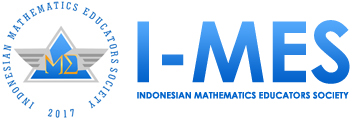LEARNING TRAJECTORY PESERTA DIDIK BERDASARKAN ARGUMENTASI MATEMATIS
Abstract
Full Text:
PDFReferences
Adolphus, T. (2011). Problems of Teaching and Learning of Geometry in Secondary Schools in Rivers State , Nigeria. Int. J. Emerg. Sci. IJES, 1(June), 143–152.
Anwar, & Rofiki, I. (2018). Investigating students ’ learning trajectory : a case on triangle. Journal of Physics: Conference Serie, 1–7. https://doi.org/10.1088/1742-6596/1088/1/012021
Begona, C. (2014). Proofs, mathematical practice and argumentation. Springer Science+Business Media Dordrecht. https://doi.org/10.1007/s10503-014-9344-0
Bieda, K. N., Ji, X., Drwencke, J., & Picard, A. (2013). Reasoning and proving opportunities in elementary mathematics textbooks. International Journal of Educational Research. https://doi.org/10.1016/j.ijer.2013.06.005
Blair, J. A. (2005). A Time for Argument Theory Integration. Critical Problems in Argumentation. http://scholar.uwindsor.ca/crrarpubhttp://scholar.uwindsor.ca/crrarpub/12http://scholar.uwindsor.ca/communicationspub
Cardetti, F., & LeMay, S. (2019). Argumentation: Building Students’ Capacity for Reasoning Essential to Learning Mathematics and Sciences. PRIMUS, 29(8), 775–798. https://doi.org/10.1080/10511970.2018.1482581
Clements, D. H., & Sarama, J. (2004). Learning trajectories in mathematics education. Mathematical Thinking and Learning, 6(2), 81–89. https://doi.org/10.1207/s15327833mtl0602
Driver, R., Newton, P., & Osborne, J. (1998). Establishing the norms of scientific argumentation in classrooms. John Wiley & Sons, Inc, 287–312. https://doi.org/https://doi.org/10.1002/(SICI)1098-237X(200005)84:3<287::AID-SCE1>3.0.CO;2-A
Driver, R., & Osborne, J. (2000). Establishing the Norms of Scientific Argumentation in Classrooms. In Sci Ed (Vol. 84).
Fauzi, I., & Arisetyawan, A. (2020). Analisis Kesulitan Belajar Siswa pada Materi Geometri di Sekolah Dasar. Jurnal Matematika Kreatif-Inovatif, 11(1), 27–35. https://doi.org/http://dx.doi.org/10.15294/kreano.v11i1.20726
Felton, M., & Gilabert, S. (2009). Deliberation versus Dispute: The Impact of Argumentative Discourse Goals on Learning and Reasoning in the Science Classroom MERCE GARCIA-MILA. In Informal Logic (Vol. 29, Issue 4).
Hatzikiriakou, K., & Metallidou, P. (2009). Teaching deductive reasoning to pre-service teachers: promises and constraints. International Journal of Science and Mathematics Education, 7, 81–101. https://doi.org/https://doi.org/10.1007/s10763-007-9113-8
Hoyles, C., & Kuchemann, D. (2002). Students’ understandings of logical implication. Educational Studies in Mathematics, 55, 193–223. https://doi.org/https://doi.org/10.1023/A:1023629608614
Indrawatiningsih, N., Purwanto, As’ari, A. R., Sa’dijah, C., & Dwiyana. (2019). Students ’ mathematical argumentation ability in determining arguments or not arguments. Journal of Physics: Conference Series. https://doi.org/10.1088/1742-6596/1315/1/012053
Kirkpatrick, J. (2016). The effects of argumentation on student motivation in mathematics. https://scholarworks.uni.edu/hpt
Knudsen, J., Lara-Meloy, T., Stevens, H. S., & Rutstein, D. W. (2014). Advice for Mathematical Argumentation. Mathematics Teaching in the Middle School, 19(8), 494–500. https://doi.org/10.5951/mathteacmiddscho.19.8.0494
Kuhn, D., & Moore, W. (2015). Argumentation as core curriculum. Learning: Research and Practice, 1(1), 66–78. https://doi.org/10.1080/23735082.2015.994254
Laamena, C. (2017). Karakteristik warrant dalam argumentasi dan pembuktian matematis. Seminar Nasional Hasil Penelitian Universitas Kanjuruhan Malang, 3, 296–302.
Lameena, C. M., Nusantara, T., Irawan, E. B., & Muksar, M. (2018). Analysis of the students’ argumentation based on the level of ability : study on the process of mathematical proof. Journal of Physics: Conference Series, 1–7. https://doi.org/10.1088/1742-6596/1028/1/012156
Liu, Y., Manouchehri, A., Brosnan, P., & Clemens, H. (2013). Aspects of Mathematical Arguments that Influence Eighth Grade Students’ Judgment of.
Liu, Y., Tague, J., & Somayajulu, R. (2016). What do eight grade students look for when determining if a mathematical argument is convincing. IEJME-Mathematics Education, 11.
NCTM. (2000). Principles and standards for School Mathematics. The National Council of Teachers of Mathematics, Inc.
Nordin, A. K., & Björklund Boistrup, L. (2018). A framework for identifying mathematical arguments as supported claims created in day-to-day classroom interactions. Journal of Mathematical Behavior, 51, 15–27. https://doi.org/10.1016/j.jmathb.2018.06.005
Noto, M. S., Priatna, N., & Dahlan, J. A. (2019). Mathematical proof: the learning obstacle of pre-service mathematics teachers on transformation geometry. Journal on Mathematics Education, 10(1), 117–126. https://doi.org/10.22342/jme.10.1.5379.117-126
Nurdin. (2011). Trajektori dalam pembelajaran matematika. Edumatica, 01(April), 1–7.
Nussbaum, E. M. (2011a). Argumentation, dialogue theory, and probability modeling: Alternative frameworks for argumentation research in education. Educational Psychologist, 46(2), 84–106. https://doi.org/10.1080/00461520.2011.558816
Nussbaum, E. M. (2011b). Argumentation, dialogue theory, and probability modeling: Alternative frameworks for argumentation research in education. In Educational Psychologist (Vol. 46, Issue 2, pp. 84–106). https://doi.org/10.1080/00461520.2011.558816
Quintana, R., & Correnti, R. (2019). The right to argue: teaching and assessing everyday argumentation skills. Journal of Further and Higher Education, 43(8), 1133–1151. https://doi.org/10.1080/0309877X.2018.1450967
Rohendi, D., Septian, S., & Sutarno, H. (2018). The Use of Geometry Learning Media Based on Augmented Reality for Junior High School Students The Use of Geometry Learning Media Based on Augmented Reality for Junior High School Students. IOP Conference Series: Materials Science and Engineering. https://doi.org/10.1088/1757-899X/306/1/012029
Rosita, C. D., Kusumah, Y. S., Suryadi, D., & Kartasasmita, B. G. (2019a). Implementation of cooperative integrated reading and composition ( CIRC ) to enhance mathematical argumentation ability of mathematics teacher students. Journal of Physics: Conference Series, 0–8. https://doi.org/10.1088/1742-6596/1280/4/042002
Rosita, C. D., Kusumah, Y. S., Suryadi, D., & Kartasasmita, B. G. (2019b). Implementation of cooperative integrated reading and composition (CIRC) to enhance mathematical argumentation ability of mathematics teacher students. Journal of Physics: Conference Series, 1280(4). https://doi.org/10.1088/1742-6596/1280/4/042002
Rumsey, C., & Langrall, C. W. (2016). Promoting mathematical argumentation. Teaching Children Mathematics, 22(7), 413–419.
Sukirwan. (2016). Argumentasi matematis mahasiswa calon guru pada suatu konjektur matematika. JPPM, 9(1), 93–101.
Surya, A. (2011). Learninng trajectory pada pembelajaran sekolah dasar (SD). Jurnal Pendidikan Ilmiah, 4(2), 22–26.
DOI: https://doi.org/10.37058/jarme.v5i2.5970
Refbacks
- There are currently no refbacks.

This work is licensed under a Creative Commons Attribution-ShareAlike 4.0 International License.
Jurnal Penelitian Otentik Pendidikan Matematika (JARME)
Program Studi Pendidikan Matematika Universitas Siliwangi
Jl. Siliwangi no. 24 Kota Tasikmalaya - 46115
email: jarme@unsil.ac.id
e-ISSN: 2655-7762
Dilisensikan di bawah Lisensi Creative Commons Attribution 4.0 International
StatCounter: Detail
Diindeks oleh :


.jpg)
.jpg)



